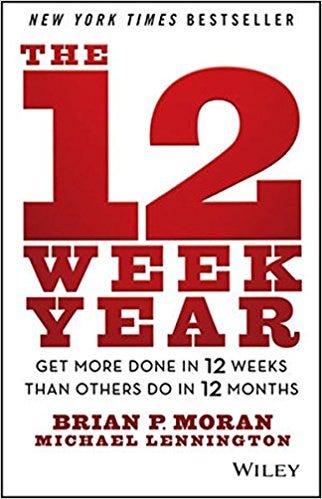Earlier this year, I read “The 12 Week Year” by Brian P. Moran and Michael Lennington.

The book argues that a calendar year — a 365 day time span — is too long a period to effectively plan and execute on your goals. Instead, you should do that process on a quarterly basis, with the help of some practices and procedures from the book.
In this post, I won’t discuss the book itself in great depth. For that, you can read this blog post by my friend Mike Fishbein, or read my own notes here. Instead, I want to discuss how the last quarter, my first “12 Week Year” — Year One — went.
Initially, I set three goals:
Some of those goals might not seem to match the oft-touted SMART criteria, they were good enough for my purposes. I had a clear sense of what I wanted and clear methods for achieving my goals.
Each goal had a number of “tactics” associated with it: one-time or recurring tasks that needed to be completed for me to succeed at that goal each week. As a part of my movement practices goal, for example, I ran three times a week, did max pull-ups and push-ups a week, did yoga and bodyweight exercises, and completed the X3 Bar introductory course. For my goal to read 20+ books, I set aside time to read each week, and tried to read one ebook and one audiobook per week.
I also needed to put certain structures in place that would help me track, evaluate, and work towards achieving my goals. These were the most helpful practices I found:
- Dedicating time to dedicate to my goals (“Strategic Blocks”)
- Dedicating time to catch up on other tasks and responsibilities (“Buffer Blocks”)
- Meeting regularly with an accountability buddy (in this case, Mike Fishbein, who I mentioned above and was a great friend and guide in the process- thanks Mike!)
I also set aside time to review and plan my week. I did not find the scoring tool provided in the book to be as helpful as I expected, but that might have been a product of this particular year and I plan to try it again in my next 12 Week Year.
Overall, I was astonished at how effective the 12 Week Year methodology was. I’ve heard many times that we overestimate how much we can do in a day and underestimate how much we can do in a year, but I got to see that discrepancy first-hand with this process.
At the beginning of my 12 Week Year, I wasn’t sure whether I would even be able to complete my first and most important goal — moving Praxis to Memberful and WordPress — and I felt sure that it if I could, it would take most of the quarter. It turned out to take three weeks of intense work, about 66 total hours of work.
When I completed this goal in the third week of the “year”, I still had nine weeks to go. I added in a completely new goal, to “Create an origin story about meditation and monasticism.” This resulted in the creation of my book, Here to Serve. I completed this by week 5, and decided to focus my efforts on my remaining two goals, which I also completed by the end of the “year.” I ended up reading 29 books!
All in all, implementing this methodology was even more effective than I expected or hoped, and I will be doing it again “next year”!
